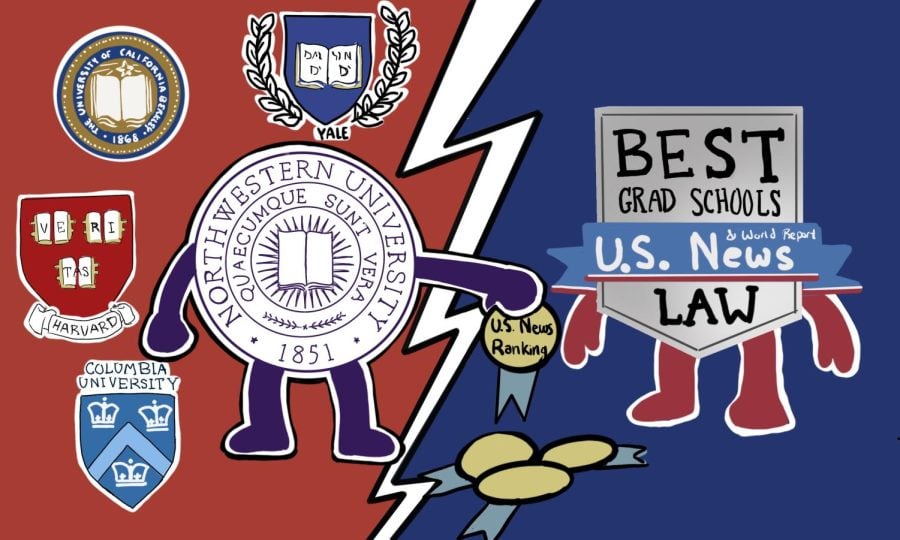Faculty discuss Pritzker School of Law opting out from U.S. News rankings
NU’s decision came after other highly-ranked law schools also announced they would no longer participate in the ranking, including Harvard Law School, Yale Law School, Georgetown University Law Center and Stanford Law School.
January 19, 2023
Northwestern’s Pritzker School of Law announced in November it would no longer participate in the U.S. News and World Report Rankings.
In 2022, the law school ranked 13th from 192 schools. NU cited multiple reasons for withdrawing from the annual report, including the system of self-reporting statistics and NU’s focus on interdisciplinary study.
“Our decision not to participate in the rankings does not change the high-quality legal education that we provide, the longstanding innovative leadership of our law school or the very strong employment and bar passage outcomes that our graduates have,” Pritzker Dean Hari Osofsky said.
NU’s decision came after other highly-ranked law schools also announced they would no longer participate in the ranking, including Harvard Law School, Yale Law School, Georgetown University Law Center and Stanford Law School. However, Osofsky said NU’s decision was independent of the other schools’ decisions.
Though these law schools will no longer self-report statistics, U.S. News has already announced that it will continue to rank the programs. The publication also announced its greater emphasis on bar passage outcomes and employment rates in their rankings, rather than outsourced assessment surveys. Some have argued that these assessment surveys do not add to the rankings, as those that participate in them do not attend the schools.
“I don’t think we have any idea whether this will affect schools’ placement in the rankings (or) whether refusing to cooperate will hurt a school,” Pritzker Prof. Michael Kang said.
Sociology Prof. David Schieber said that NU’s decision is not surprising.
According to Schieber, U.S. News has created a “monopoly” over the ranking system. Its high burden of self-reporting for ranking limits a law school’s ability for upward mobility, he said.
“Rankings affect everyone,” Schieber said. “If you’re ranked number one, you want to stay at number one. If you’re ranked number 75, you want to move up to 70, you don’t want to drop down … No law school really wants to play this game.”
The U.S. News rankings place a heavy emphasis on employment after graduation, which Osofsky said disincentivizes support for interdisciplinary programs.
She said Pritzker will continue to support interdisciplinary knowledge by offering joint degree programs and other educational opportunities.
Osofsky added that U.S. News does not account for students who choose to engage in public interest fellowships and other similar programs, but that Pritzker is committed to supporting these students.
“The decision by U.S. News to devalue employment that is funded by public interest fellowships and to exclude loan forgiveness programs in its debt calculations does not support these efforts by our law school and other law schools to support our students,” Osofsky said.
It’s not yet clear whether undergraduate schools and other graduate programs will follow suit, according to Schieber, though Harvard Medical School already announced Wednesday its withdrawal from the U.S. News medical school rankings.
Schieber said alternative ranking systems could prompt this transition for more schools.
“Dissatisfaction with the methodology (of rankings) is not limited to law schools,” Kang said. “If it’s successful in changing in a constructive way how the U.S. News does its rankings, then I think it’s very likely to spread.”
Email: NicoleMarkus2025@u.northwestern.edu
Twitter: @nicolejmarkus
Related Stories:
— Pritzker Prof. Michael Kang analyzes Supreme Court reform on Presidential Commission
— Northwestern drops to 10th place in U.S. News college rankings



